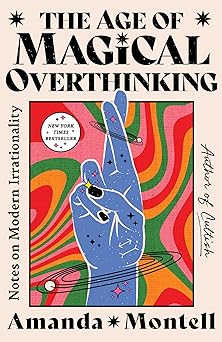
Humans have a way of rationalizing the world around them in order to create a sense of control and agency. We tell ourselves that our thoughts and actions can affect the world outside of ourselves, and that by doing so, we can shape our reality. However, what happens when this belief is put to the test? In "The Age of Magical Overthinking", author Amanda Montell explores the inner workings of the human mind and its biases, revealing how our brains cope with chaos and uncertainty.
One of the main concepts Montell delves into is the idea of "magical thinking". This is when we believe that our internal thoughts can affect unrelated events in the external world. For some, it might be the conviction that positive thinking can change their circumstances, while for others, it's the belief that their thoughts can ward off illness or bring about good fortune. Montell argues that in the modern information age, our brains' coping mechanisms have been overloaded, and our irrationality has turned up to an eleven. She breaks down various cognitive biases, such as the "halo effect", which can make us worship or despise celebrities, to the "sunk cost fallacy", which can keep us stuck in relationships that no longer serve us. Through these explanations, Montell sheds light on how these biases affect our lives and relationships.
Montell's goal in writing this book is not to dismiss our attempts to control our lives, but to understand and empathize with them. She seeks to make sense of the senseless and to offer hope and forgiveness for our anxiety-addled human selves. In essence, she wants to open a window in our minds and let in a warm breeze, quieting the cacophony and allowing us to hear a melody. With wit and brilliance, Montell navigates the complexities of human thought, revealing the intricate workings of our minds and the ways in which we attempt to make sense of the world.
This book is a thought-provoking exploration of the human mind and its limitations. I was struck by how relatable the author's concepts are, as I've experienced my fair share of times when I've struggled to understand why my thoughts and actions don't seem to have the desired outcome. The author does a wonderful job of breaking down complex cognitive biases and how they affect our lives and relationships. For instance, I found the concept of the "halo effect" to be particularly eye-opening, as I've often found myself judging people or situations based on a single, superficial trait.
What I appreciated most about this book is the author's empathetic approach. She doesn't dismiss our attempts to control our lives, but rather seeks to understand and support them. I found her words to be comforting and reassuring, especially when it comes to acknowledging the anxiety and uncertainty that can come with navigating the world. Throughout the book, I felt like I was having an internal conversation with the author, where she gently coaxes us to examine our thoughts and behaviors, and to offer ourselves compassion and understanding. Her writing is approachable and accessible, making it easy to follow her arguments and insights.
One of the most striking aspects of this book is its ability to balance intellectual rigor with warmth and empathy. The author tackles complex topics like cognitive biases and magical thinking with a level of nuance and sensitivity that makes the book feel like a gentle discussion with a dear friend. She's not trying to convince us of a particular point of view, but rather to help us see ourselves and our thoughts in a new light. Ultimately, this book is about acknowledging our limitations and finding a sense of peace and understanding in the midst of life's uncertainties.
Rating: 4.7 / 5.0
Humans have a way of rationalizing the world around them to create a sense of control and agency. This belief is put to the test in this book, revealing how our brains cope with chaos and uncertainty. The book explores the idea of "magical thinking" and cognitive biases such as the "halo effect" and the "sunk cost fallacy", which can affect our lives and relationships. The author's goal is to understand and empathize with our attempts to control our lives, not to dismiss them. With wit and brilliance, the author navigates the complexities of human thought, making sense of the senseless and offering hope and forgiveness for our anxious human selves. This book is a thought-provoking exploration of the human mind and its limitations, written in a compassionate and approachable tone.